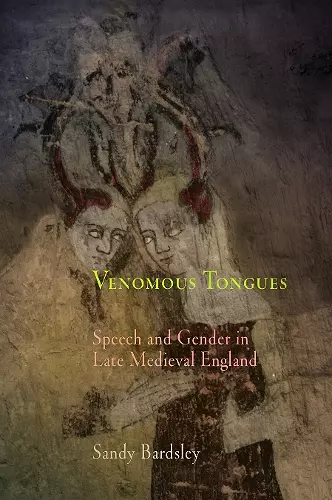Venomous Tongues
Speech and Gender in Late Medieval England
Format:Hardback
Publisher:University of Pennsylvania Press
Published:31st May '06
Currently unavailable, and unfortunately no date known when it will be back

"The unique contribution of Venomous Tongues lies in its interdisciplinary approach and the way it situates scolding within a broader range of issues specific to the legal and social history of the period."—L. R. Poos, The Catholic University of America
"The unique contribution of Venomous Tongues lies in its interdisciplinary approach and the way it situates scolding within a broader range of issues specific to the legal and social history of the period."-L. R. Poos, The Catholic University of America
Sandy Bardsley examines the complex relationship between speech and gender in the fourteenth and fifteenth centuries and engages debates on the static nature of women's status after the Black Death. Focusing on England, Venomous Tongues uses a combination of legal, literary, and artistic sources to show how deviant speech was increasingly feminized in the later Middle Ages. Women of all social classes and marital statuses ran the risk of being charged as scolds, and local jurisdictions interpreted the label "scold" in a way that best fit their particular circumstances. Indeed, Bardsley demonstrates, this flexibility of definition helped to ensure the longevity of the term: women were punished as scolds as late as the early nineteenth century.
The tongue, according to late medieval moralists, was a dangerous weapon that tempted people to sin. During the fourteenth and fifteenth centuries, clerics railed against blasphemers, liars, and slanderers, while village and town elites prosecuted those who abused officials or committed the newly devised offense of scolding. In courts, women in particular were prosecuted and punished for insulting others or talking too much in a public setting. In literature, both men and women were warned about women's propensity to gossip and quarrel, while characters such as Noah's Wife and the Wife of Bath demonstrate the development of a stereotypically garrulous woman. Visual representations, such as depictions of women gossiping in church, also reinforced the message that women's speech was likely to be disruptive and deviant.
"The unique contribution of Venomous Tongues lies in its interdisciplinary approach and the way it situates scolding within a broader range of issues specific to the legal and social history of the period. Its subject matter makes it likely to be read by many beyond specialists: those interested in comparative women's history, in oral culture, and in anthropologically influenced modes of social/cultural analysis." * L. R. Poos, The Catholic University of America *
- Winner of Winner of the 2006 First Book Prize of the Berkshire Conference of Women Historians 2021
ISBN: 9780812239362
Dimensions: unknown
Weight: unknown
224 pages